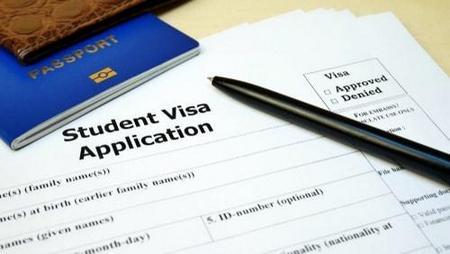What Are the Regulations and Requirements of a Student Visa?
 Being granted the opportunity to attend an academic institution or vocational training program in the United States is an achievement for any foreign student to accomplish. Upon being authorized to study at the preferred institution, incoming visitors must also be granted a student visa to support their time in the United States. A student visa is a form of documentation that allows a citizen of a foreign country to enter the United States for educational purposes.
Being granted the opportunity to attend an academic institution or vocational training program in the United States is an achievement for any foreign student to accomplish. Upon being authorized to study at the preferred institution, incoming visitors must also be granted a student visa to support their time in the United States. A student visa is a form of documentation that allows a citizen of a foreign country to enter the United States for educational purposes.
Student Visa Categories
Upon being accepted to his or her desired school of choice, the incoming student must register with the Student and Exchange Visitor Information System (SEVIS). Once certified, the pupil will receive a “Form I-20,” a required document for any international student. The remaining action would be to apply for the correct student visa category, which is distinguished into two classifications:
- Category F-1 would be for people looking to attend a private elementary school, high school, university/college, seminary, conservatory, or any different educational institution, such as a language training program.
- Category M-1 applies to anyone who is seeking vocational training or is enrolled in another non-academic institution.
Within each category, there is a visa available for the student’s spouse or minor child so that they would be able to accompany the student.
Obligations and Stipulations
Coming to a new country can be a difficult transition for any foreign student as a result of the new customs, laws, and way of life. Lacking a support system of friends and family as well as adjusting to the regulations that are linked to student visas can leave incoming pupils struggling to acclimate. Each classification of student visas, Category F-1 or Category M-1, have different precedents that the adherent must follow:
- Category F-1 students must fulfill all of his or her educational arrangements as well as attend and pass every class. Once one academic year has been completed, the student would be eligible for vacation. Category F-1 students must be authorized by his or her DSO (Designated School Official) or the U.S. Citizenship and Immigration Services (USCIS) in order to gain employment while on their visa.
- Category M-1 students are not eligible for employment during their stay; however, he or she may be authorized for practical training employment. M-1 pupils can be a part of practical training employment after the completion of their vocational program. A recommendation from the designated DSO and authorization from the USCIS are required for matters of practical training employment.
Failure in any of these regulations could result in the revocation of a student visa and deportation back to the pupil’s home country. Seeking the support and guidance of an experienced immigration lawyer can help the student understand the intricate process of a student visa much easier.
Contact an Illinois Immigration Attorney
Student visas provide many opportunities for aspiring learners throughout the globe. The rules and regulations attached to student visas may seem excessive, but they exist in an effort to protect the United States citizens as well as the students coming here for an education. It is important for these learners to be aware of the stipulations to which they are agreeing. The experienced Illinois immigration lawyers at Mevorah & Giglio Law Offices will work with you to ensure your education is a priority. Contact our office today at 630-932-9100 for a free consultation.
 English,
English,
 Spanish,
Spanish,
 Polish,
Polish,
 Urdu
Urdu













 Make a Payment
Make a Payment



